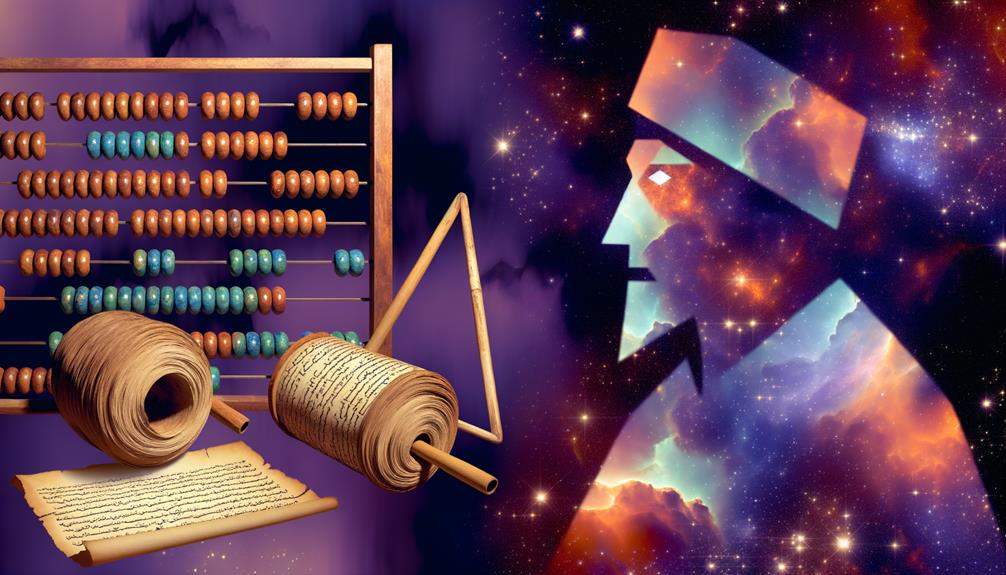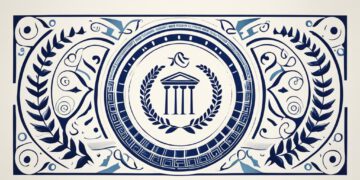Mankind’s mastery of math is a mesmerizing mystery. You’ve probably pondered about the origin of this precise and powerful tool that shapes our world. Was it an invention of ancient civilizations, developed over time, or is it an inherent part of the universe, merely discovered by humans?
This engaging enigma invites us to journey back, exploring the dawn of mathematical concepts, tracing its evolution, and appreciating the minds that molded it. As we embark on this exploration, let’s ask ourselves: who truly created math?
The dawn of mathematical concepts
How did the earliest mathematical concepts emerge in human history? Well, you’ve got to rewind the clock about 20,000 years. Yes, you heard right! Your ancestors, the Paleolithic people, laid the groundwork for math without even realizing it.
They didn’t have formal equations or fancy calculators. Instead, they used simple tally marks on bones and rocks to keep track of goods or time. Imagine you’re a caveman, you’ve just killed an animal for dinner. You’d mark a notch on a bone to remember your successful hunt. Over time, these marks evolved into a numerical system.
Fast forward a few thousand years to 4,000 BC. People in Mesopotamia are developing a more advanced system, using symbols to represent numbers up to 60. That’s right, they’ve just invented the sexagesimal system, which we still use today to measure time and angles.
Ancient civilizations and mathematics
Often, you’ll find that ancient civilizations, like the Egyptians and Greeks, played a pivotal role in the evolution of mathematics. The Egyptians, for instance, developed mathematical concepts for practical purposes like measuring fields, predicting the Nile’s flooding, and designing pyramids. They’re credited with early forms of arithmetic and geometry.
You’d be fascinated to know that Egyptian mathematics was deeply interwoven with their religion and philosophy. They believed numbers had mystical significance. So, they often used them in their sacred architecture and rituals.
The Greeks, on the other hand, took a more abstract and philosophical approach. They’re known for their advancements in geometry, with figures like Pythagoras and Euclid laying substantial groundwork. Unlike the Egyptians, who used math practically, the Greeks sought pure mathematical truths.
It’s also worth mentioning the Babylonians from Mesopotamia, who made impressive strides in algebra and developed the base-60 number system, which we still use in timekeeping and angles.
Mathematical evolution through the ages
Throughout the ages, you’ll see that mathematics has evolved dramatically, with each era making significant contributions to the field. Interestingly, it’s not a static discipline but a dynamic one, constantly adapting to the needs and discoveries of the time.
In ancient times, you’d see math used in practical ways, like counting livestock or measuring land. During these ages, it was all about survival. The Ancient Egyptians and Babylonians developed the first known mathematical systems, including the concept of zero and the principles of geometry.
As civilizations progressed, so did their mathematical understanding. The Classical Greek period brought a more abstract approach to math, focusing on logic and proofs. This era birthed the foundation of modern geometry and number theory.
The Middle Ages saw the expansion of math through the Islamic world, which preserved Greek knowledge and expanded upon it. This era saw advancements in algebra and trigonometry.
The Renaissance, with its renewed interest in science and knowledge, further pushed the boundaries of mathematics. It fostered advancements in calculus and probability theory.
In the modern era, you’re seeing unprecedented growth in the field. There’s complex analysis, number theory, and statistics. It’s a testament to how math has evolved through the ages, adapting to the needs and discoveries of each epoch.
Significant contributors to mathematics
While we’ve traced the evolution of math as a discipline, let’s not forget the individuals who’ve made invaluable contributions to its development. Think about Euclid, ‘the Father of Geometry.’ His work, ‘The Elements,’ forms the basis of modern mathematical thinking.
Then there’s Pythagoras, who you might remember from geometry class. His theorem is still a cornerstone in mathematics. You can’t discuss math without mentioning Archimedes, the ancient Greek who offered groundbreaking ideas in calculus, physics, and engineering.
Now, let’s jump ahead to the 17th century. You’ve probably heard of Sir Isaac Newton and Gottfried Wilhelm Leibniz. They’re the guys responsible for calculus, allowing us to understand change and motion in a whole new way.
Don’t forget Carl Friedrich Gauss, the ‘Prince of Mathematicians.’ His work in number theory, statistics, and analysis continue to influence math today. And let’s end with the genius, Albert Einstein, whose theory of relativity revolutionized our understanding of space, time, and gravity.
Each of these brilliant minds helped shape the math you’re using today. So, next time you solve a complex equation, take a moment to appreciate the minds behind the math.
The journey of mathematics into modernity
Ever wondered how mathematics evolved into the complex discipline it’s now? Let’s delve into its journey into modernity. From its humble origins in the ancient world, math has blossomed into a highly sophisticated field of study.
The transformative journey began in the Renaissance era. You can credit the development of algebra and calculus to this period. As trade routes expanded, so did the exchange of knowledge. New mathematical concepts were inspired and refined, paving the way for scientific advances.
In the 19th century, the focus shifted to defining and formalizing mathematical structures. You’ve probably heard of the ‘set theory’, haven’t you? It’s a cornerstone of modern mathematics, born out of this era.
The 20th century brought forth computers, changing the face of math once again. Today’s mathematics is a blend of ancient theories, innovative thinking, and advanced technology. It’s everywhere – from your smartphone calculations to the algorithms that predict your online behaviors.
Conclusion
‘You’ve journeyed from the dawn of math, through ancient civilizations and notable contributors, to modern math. No single person created math. Instead, it evolved over centuries, shaped by countless minds, from early humans creating basic counting systems to modern mathematicians, pushing boundaries.
In essence, humanity is the creator of math, a testament to our endless curiosity and desire to understand the world around us. Math, like us, continues to grow and evolve.’










